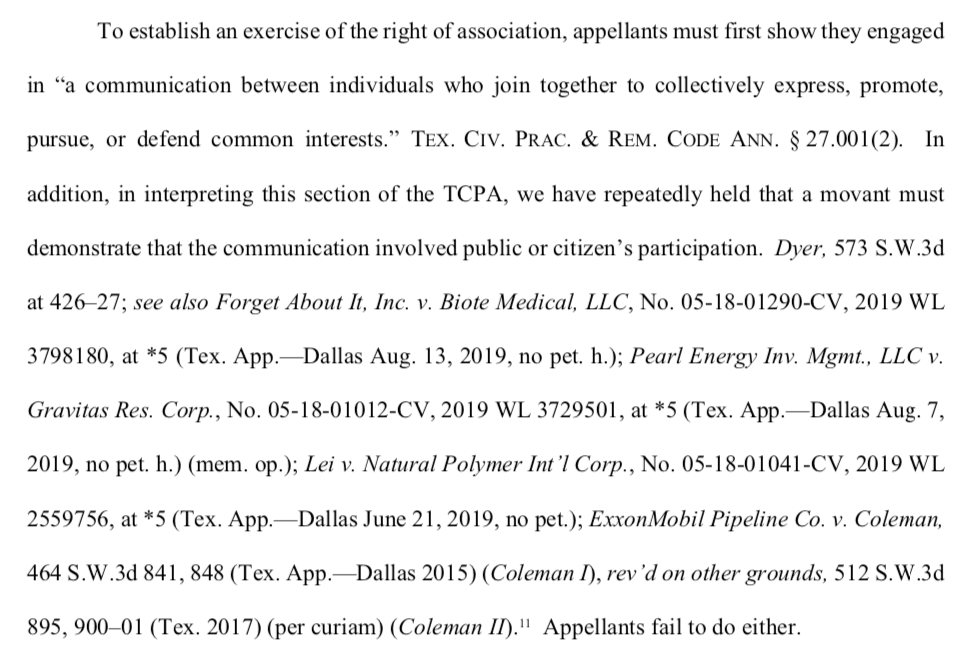Is a petition a “petition”?
That’s the question raised in the recent case Florez v. Olibas, No. 08-19-00302-CV (Tex. App.—El Paso July 26, 2022, no pet. h.).
Let me explain.
The Texas Citizens Participation Act (the “TCPA”) is the Texas “anti-SLAPP” statute. I used to write a lot of blog posts about the TCPA, and then I stopped when it became less relevant to my practice. You can read a recap at Shrinkage: TX Legislature and 5th Circuit Cut the TCPA Down to Size.
In a nutshell, if the TCPA applies to a lawsuit, then it gives the defendant an opportunity to try to get the case dismissed for lack of evidence at an earlier stage than usual. That can be a big deal.
The TCPA’s definition of a “legal action”
The TCPA applies to a “legal action.” Prior to amendments that took effect in 2019, the TCPA defined a legal action as: “a lawsuit, cause of action, petition, complaint, cross-claim, or counterclaim or any other judicial pleading or filing that requests legal or equitable relief.” Tex. Civ. Prac. & Rem. Code § 27.001(6).
Emphasis added. Here’s why.
Rule 202 of the Texas Rules of Civil Procedure provides a procedure where you can take a “pre-suit” deposition, i.e. a deposition of a witness intended to preserve evidence for a potential lawsuit and/or to investigate whether you have a basis for a lawsuit.
Rule 202 has certain hoops to jump through, but the key point is that the way to seek a Rule 202 deposition is to file a petition.
You can see where this is headed.
Is a Rule 202 “petition” a “petition” under the TCPA?
Suppose a petitioner files a Rule 202 petition, and the respondent responds by filing a TCPA motion to dismiss. Does the TCPA even apply? Is a Rule 202 petition a “legal action” under the TCPA?
There’s an obvious, simple textualist answer. The statute defines “legal action” to include a “petition.” You commence a Rule 202 case by filing a petition. A “petition” is a “petition.” Therefore, it is a “legal action,” as defined by the statute.
Case closed, right?
The Amarillo Court of Appeals, Fort Worth Court of Appeals, and Austin Court of Appeals thought so. They all held that a Rule 202 petition is a “legal action” under the TCPA. In re Krause Landscape Contractors, Inc., 595 S.W.3d 831, 836 (Tex.App.—Amarillo 2020, no pet.); DeAngelis v. Protective Parents Coalition, 556 S.W.3d 836, 848-49 (Tex.App.—Fort Worth 2018, no pet.); In re Elliott, 504 S.W.3d 455, 463 (Tex.App.—Austin 2016, no pet.)
But the Houston Courts of Appeals disagree. (There are two of them, which I know sounds weird if you’re not from Texas, but just go with it). They say that analysis is too simplistic. See Hughes v. Giammanco, 579 S.W.3d 672, 677 (Tex. App.—Houston [1st Dist.] 2019), judgment set aside, opinion not vacated, No. 01-18-00771-CV, 2019 WL 3331124 (Tex. App.—Houston [1st Dist.] July 25, 2019, no pet.) (mem.op.); Houston Tennis Assoc., Inc. v. Thibodeaux, 602 S.W.3d 712, 718 (Tex. App.—Houston [14th Dist.] 2020, no pet.) (citing Hughes).
The El Paso Court of Appeals weighs in
The most recent court to address the issue is the El Paso Court of Appeals. In the court’s opinion, Chief Justice Rodriguez agreed with Amarillo, Fort Worth, and Austin, disagreed with Houston, and held that a Rule 202 petition is a “legal action” under the TCPA. Florez v. Olibas, No. 08-19-00302-CV (Tex. App.—El Paso July 26, 2022, no pet. h.).
Justice Alley wrote a concurring opinion to emphasize two points: (1) the holding only applies to the old version of the TCPA (pre-2019 amendments), and (2) the “claim in question” in a Rule 202 case is not the cause of action being investigated, but the claim that the petitioner is entitled to a pre-suit deposition.
Justice Palafox wrote a dissenting opinion saying she would adopt the analysis of the Houston Court of Appeals in Houston Tennis Association.
So who was right?
As much as I would like to express my personal opinion, I represent the winning respondents/appellants in Florez, so it’s probably safer that I refrain.
But what do you think?
____________
Zach Wolfe (zach@zachwolfelaw.com) is a Texas trial lawyer who handles non-compete and trade secret litigation at Zach Wolfe Law Firm (zachwolfelaw.com). Thomson Reuters named him a Texas “Super Lawyer”® for Business Litigation in 2020, 2021, and 2022.
These are his opinions, not the opinions of his firm or clients, so don’t cite part of this post against him in an actual case. Every case is different, so don’t rely on this post as legal advice for your case.





Leave a Comment